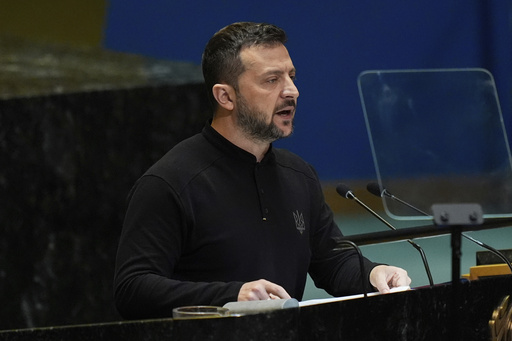UNITED NATIONS — Marking the third year since Russia commenced its invasion of Ukraine, the United Nations General Assembly is set to vote Monday on two contrasting resolutions. One is a proposal from Ukraine, backed by various European nations, calling for the immediate withdrawal of Russian troops from its territory. The other is a resolution from the United States that advocates for a prompt conclusion to the conflict but notably avoids direct condemnation of Russia’s actions.
As discussions developed, the U.S. exerted influence on Ukraine to retract its non-binding resolution in favor of the American proposition, according to insights from a U.S. official and a European diplomat. However, Ukraine opted to maintain its stance, leading to a scheduled vote in the assembly, which comprises 193 nations. All individuals involved in the discussions have chosen to remain anonymous, given the confidential nature of the negotiations.
This situation encapsulates the rising tensions between the U.S. and Ukraine following President Donald Trump’s unexpected initiative to engage with Russia in efforts to swiftly end the war. It also highlights strains within the transatlantic alliance, specifically concerning European reaction to the dramatic shifts in the Trump administration’s approach toward Russia. European leaders expressed frustration at being excluded from preliminary discussions that took place last week, which included Ukraine.
Trump has recently escalated his rhetoric, labeling Ukrainian President Volodymyr Zelenskyy a “dictator,” wrongly claiming that Ukraine initiated the conflict, and warning that Zelenskyy must move quickly to negotiate an end to hostilities or face losing his leadership. In response, Zelenskyy accused Trump of operating within a Russian propaganda framework.
Consequently, not only did the Trump administration choose not to support Ukraine’s resolution at the U.N., but it also hurriedly introduced its alternative resolution, urging its allies to favor this version instead. This development coincides with Trump’s planned meeting with French President Emmanuel Macron on Monday in Washington.
Additionally, the U.S. expressed interest in putting its proposal to a vote in the more influential U.N. Security Council, where China currently holds the presidency and has arranged a vote for Monday afternoon.
In light of the Security Council’s paralysis due to Russia’s veto power, the General Assembly has become the principal U.N. body addressing the situation in Ukraine. The assembly operates without vetoes, and Ukraine’s resolution is jointly sponsored by all 27 member states of the European Union, making its adoption virtually assured. While the resolutions passed by the General Assembly serve as indicators of global sentiment, they do not possess the legal weight of those adopted in the Security Council.
Since the outbreak of conflict with Russia’s invasion on February 24, 2022, the General Assembly has passed several resolutions condemning Moscow’s actions and insisting on the immediate withdrawal of its forces. The votes on these conflicting resolutions are anticipated to attract considerable attention, serving as a measure of diminished support and gauging backing for Trump’s aspirations to facilitate an end to the conflict.
The succinct draft resolution proposed by the U.S. recognizes “the tragic loss of life throughout the Russia-Ukraine conflict” and calls for a swift resolution while urging for sustained peace, notably omitting any mention of Russia’s invasion.
Russia’s U.N. envoy, Vassily Nebenzia, expressed support for the U.S. resolution last week, describing it as “a good move.”
In stark contrast, Ukraine’s resolution delineates “the full-scale invasion of Ukraine by the Russian Federation” and underlines the necessity to uphold previously adopted assembly resolutions in response to Russian aggression. It explicitly calls for Russia to “immediately, completely and unconditionally withdraw all of its military forces” from Ukraine within its recognized borders.
Furthermore, it raises alarms about potential escalations from North Korean troops collaborating with Russia and reaffirms the assembly’s commitment to Ukraine’s sovereignty, asserting that any territorial gains achieved through aggression will not be considered legitimate.
The resolution also advocates for “de-escalation, an early cessation of hostilities, and a peaceful resolution” to the ongoing war in Ukraine, reiterating the pressing necessity for an end to the conflict within the current year.


